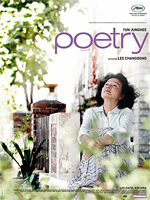Synopsis: Mija (formidably portrayed by South Korean actress Yun Jung-hee) is an elderly woman facing the progressive pain of memory loss. Words escape her, and it is now difficult for her to find the right word. She joins a poetry club, perhaps a way to find meaning in her life but also to exorcise the affliction that strikes her by substituting a reality, which she struggles to articulate, with a form of symbolic or even imaginative expression.
Mija, who works as a housekeeper for a wealthy and disabled elderly man, also takes care of her own grandson, a mute and apathetic teenager whose divorced mother has gone to work in another city.
The corpse discovered at the beginning of the story is that of a schoolgirl who committed suicide and was a victim of a gang rape a few days earlier.
We learn that Mija’s grandson is part of the group of boys who committed this crime.
She is contacted by a committee formed by the parents of the guilty adolescents who hope to spare their offspring from the shame of the legal consequences of the rape and convince the girl’s mother not to press charges in exchange for a sum of money.
An award-winning screenplay and exceptional acting
It is not very important to understand the outcome of the storyline because the reason for the beauty of this film is not found there. It resides in the performance of actress Yun Jung-hee, unfortunately unknown to the European audience, who brings a charm to her character that will linger long in the memories of the spectators.
This charm merits all our admiration and should be an example for a whole generation of artists: the right gesture, the light word spoken when it should be spoken, a detached expression, even distant in relation to the events that overwhelm her and which at the same time she wants to know and understand.
This film is ultimately a kind of coming-of-age story of rare sensitivity in the face of the indifference and insensitivity of the other characters.
We witnessed a very beautiful film, with a deliberative and intentional slowness as dictated by Asian lifestyle (hence the film’s length, 2 hours and 20 minutes), unfolding around a narrative journey blending perfect balance of symbolic expression and moral equation.
Between politics and the 7th art
Director Lee Chang-Dong (already known for “Secret Sunshine” shot in 2007) masterfully created this exceptional film which won the Best Screenplay Award at the last Cannes Film Festival. Lee Chang-Dong was a writer before becoming a director and also served as Minister of Culture in his country between 2003 and 2004, a brief tenure which saw him resign in protest against trade agreements between the Republic of South Korea and the United States over American film quotas.
Moreover, public preference for commercial films (as in this film) did not propel it into Korean theaters since Poetry had only 200,000 admissions in South Korea.


